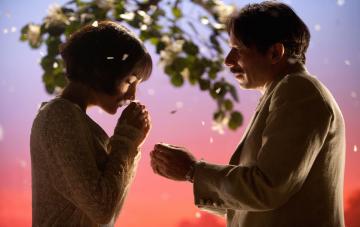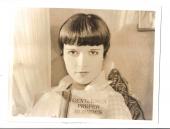Sunday, July 28, 2024 - 8:23am
Humor, pain mix in 'Chicken With Plums'
Ah, Tehran -- such a charming, sophisticated city in 1958, when the late, not-so-great shah was in charge. You could concentrate on your artistic and romantic angst, instead of your fear and loathing of the ayatollahs, back then.
Once upon that time and place, there lived a great musician named Nasser-Ali Khan, whose unbeloved wife smashed his much-beloved violin during an argument. He could replace it, right? Wrong. He tries, but finds no instrument equal to it. With a broken fiddle and broken heart, he takes to his bed and resolves to die.
"Chicken With Plums," adapted by Marjane Satrapi from her own graphic novel, chronicles Nasser-Ali's last week, with stunning flashbacks and flashforwards to shed past and future light on his deathly decision. There will be supernatural encounters with the Angel of Death (Edouard Baer) and with Sophia Loren's breasts.
But mostly, for Nasser-Ali (Mathieu Amalric), there will be quotidian encounters with his shrewish wife Faringuisse (Maria de Medeiros), their two scruffy kids and the ongoing painful memory of his lost love, Irane (Golshifteh Farahani). Since losing her long ago, the only passion in his loveless life has been music. But his once-great career was in woeful decline even before his violin's destruction. A pawnbroker claims to have a Stradivarius once owned by Mozart -- as well as magic wands and opium -- for sale. You can get anything you want at that kinda restaurant, except the antidote to despair.
Director-writer collaborators Satrapi and Vincent Paronnaud evoked Ms. Satrapi's own time and place in "Persepolis" (2007), their much-acclaimed black-and-white animated film of an Iranian girl's life and challenges during the 1979 Islamic revolution. "Chicken" is a prequel, envisioned as the second in a grand romantic-political trilogy, in which they switch to live action for a nostalgic re-creation of the secular Westernized life of the Persian middle class during the shah's heyday.
The film, divided into daily chapters, is a seriocomic countdown to Nasser-Ali's demise. For the first few days, he contemplates various forms of suicide -- impatiently awaiting but averse to hastening the end, a la Dorothy Parker: "Razors pain you, rivers are damp, acid stains you, drugs cause cramp ..." A Socrates hemlock fantasy is appealing, but discarded. He's concerned about how he'll be remembered and about what his son wants to be when he grows up ("a grocer"). On Day Four, the remorseful wife tries to lure him back to life by preparing his favorite dinner -- the eponymous chicken with plums -- a little too little, a little too late.
Meanwhile, his troubled dreams, reveries and memories are visually rendered in a dazzling array of styles, from Hollywood Technicolor to German Expressionist chiaroscuro and Spanish magic realism, with playful Fellini-esque surreal inserts and an animated sequence or two for good measure. You'll find wry stylistic tributes to Truffaut as well as Bergman, plus a dose of Dickens: The terrifying Death Angel -- like the ghosts of Christmas -- shows him the future fates of his children, even while solicitously advising, "Calm down, you'll hurt yourself."
As the churlishly self-absorbed Nasser, Amalric and his wild-eyed nervous energy are initially off-putting but more sympathetic as the flashback details and motivations emerge. Turns out, his weird mother (well played by Isabella Rossellini, now with a haunting resemblance to her own gorgeous mom, Ingrid Bergman) forced him to wed Faringuisse. "I don't love her," he protested. "Marry first, love will come later," Mama declared.
He did; it didn't.
Speaking of gorgeous mothers and daughters, Chiara Mastroianni -- offspring of Marcello and Catherine Denueve -- has an effective moment as Nasser-Ali's languid little girl in adulthood. Less effective is the incongruous flash-forward to his grandson, inhabiting a farcical American sitcom in Wyoming!
Cinematographer Christophe Beaucarne is capable of the most gorgeous images: A single snowflake floats slowly into a child's mouth ... A ball of cigarette smoke emanating from Nasser's mother hovers surreally over her grave ... Olivier Bernet's lush score (a fine mix of Russian orchestral and Iranian folk influences) matches every mood but is oddly devoid of violin virtuosity. That's a serious flaw, perhaps a reflection of the facile profundity of the comic book source: "You are a great musician, and from now on the love you have lost will be in each note you play!" says Nasser-Ali's violin master. His music and musical "genius" are constantly referenced -- but never really shown.
The recipe for this "Chicken" attempts to balance serious and humorous with a piquant, melancholy seasoning. The result is either whimsical or lugubrious, colorfully complex or just full of disjointed juxtapositions, depending on your tastes.
You've heard of "Six Characters in Search of an Author"? This is Six Styles in Search of a Structure. Creatively, it's very beautiful and fascinating. Cinematically, it's a very beautiful and a fascinating failure to coalesce.
Vote:






